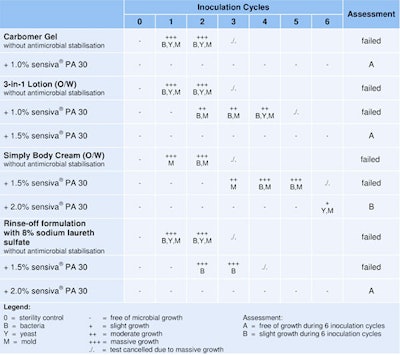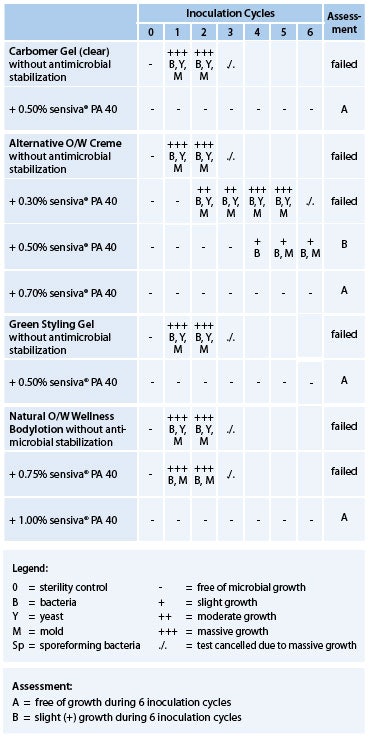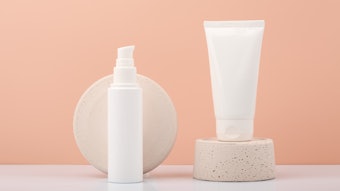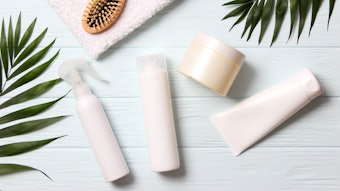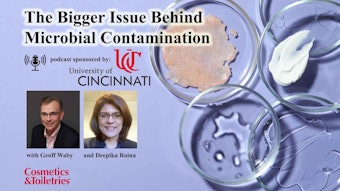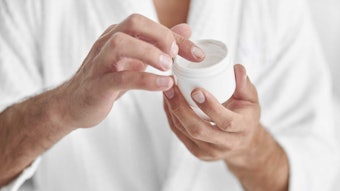
Today's consumer wants it all. They want products that are close to nature, equating natural to safe and gentle. They also want products that provide a noticeable benefit, providing all of the function that modern science can offer. It is the job of the personal care products formulator to find the balance between these and offer a bridge between these worlds.
schülke's sensiva® line of multifunctional additives provides personal care products with just this balance. The latest evolutions of this line, sensiva® PA 30 and sensiva® PA 40, are as gentle as natural and as effective as traditional preservatives.
Both new products include Zemea® Propanediol, from DuPont Tate & Lyle Bio Products. This innovative, skin-friendly, 100% natural glycol alternative is used as a humectant or natural solvent in cosmetics and personal care products. Studies have shown that Zemea® can boost the efficacy of preservatives, potentially reducing the amount of preservatives needed in the formulation.
sensiva® PA 30 combines natural Zemea® Propanediol with two nature-identical fragrance ingredients. It offers a lower odor, more broad-spectrum antimicrobial stabilizer as compared to most natural options. The standardization and consistent supply characteristic of nature-identical materials is particularly important for a preservative system that needs to reliably protect product and consumer against microbial contamination.
sensiva® PA 40 takes this concept one step further, combining natural Zemea® Propanediol with a nature-identical fragrance ingredient and a gentle synthetic also known to be an excellent moisturizer. Unlike most non-traditional preservative blends, this synergistic combination can be used at levels similar to more traditional preservative systems.
Challenge tests performed on a variety of cosmetic formulations show both new sensiva® products to be effective antimicrobial stabilizers. In the schülke challenge test method, a mixture of bacteria, yeast and mold is inoculated 6 times (once a week) into the test material with the goal of keeping the test material germ-free for this period. The A criteria is met when the product shows no signs of contamination at any evaluation point during the test. The B criteria is met when only very low levels of contamination are seen at any evaluation point during the testing. Products meeting the B criteria can have their microbiological stability improved by employing other control factors, such as tamper-resistant packaging. As seen in Table 1, sensiva® PA 30 has been shown to effectively stabilize personal care formulas against microbial contamination at levels between one and two percent by weight. sensiva® PA 40 has been shown effective against microbiological contamination at levels between 0.5 percent and 1.5 percent, similar to the levels required by more traditional preservative blends (Table 2). Additionally, they support deodorant activity, as they have been shown to inhibit the growth and multiplication of odor-causing bacteria.
The best of science and nature can co-exist in modern personal care products. schülke has designed a bridge between the two, by combining the gentleness of nature with the efficacy of science to produce two new antimicrobial stabilizer blends that are perfect for use in nature-inspired products.
To learn how schülke can partner with you to bridge the gap to better products, visit our website or contact the company at 1-888-267-4220.
Disclaimer:
The above paid-for content was produced by and posted on behalf of the Sponsor. Content provided is generated solely by the Sponsor or its affiliates, and it is the Sponsor’s responsibility for the accuracy, completeness and validity of all information included. Cosmetics & Toiletries takes steps to ensure that you will not confuse sponsored content with content produced by Cosmetics & Toiletries and governed by its editorial policy.
